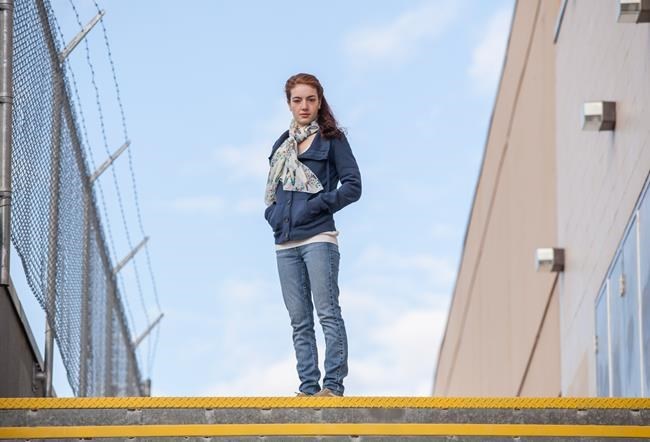
University of British Columbia student Stephanie Hale, 22, poses for photograph in Kamloops, B.C., on Thursday, October 20, 2016. When Stephanie Hale read the University of British Columbia's new sexual misconduct policy, she had mixed emotions. The 22-year-old undergraduate had refused to participate in a hearing last November on her complaint of sex assault because it took place under the university's existing procedures, which allow a panel of students to judge whether an assault occurred. The hearing was held without her. THE CANADIAN PRESS/Jeff Bassett
February 12, 2017 - 3:00 AM
VANCOUVER - When Stephanie Hale read the University of British Columbia's new sexual misconduct policy, she had mixed emotions.
The 22-year-old undergraduate had refused to participate in a hearing last November on her complaint of sex assault because it took place under the university's existing procedures, which allow a panel of students to judge whether an assault occurred. The hearing was held without her.
Now, after significant pressure from students and advocates on campus, the university has revised its draft policy to allow for highly trained, trauma-informed investigators to handle all allegations of sexual assault made against members of the UBC community.
"I'm sad for myself that I didn't get to go through a legitimate system that's going to treat me as a participant," said Hale. "But I am very glad to know that future victims are going to have a system that's going to work for them and take their needs and wants into account."
Universities in B.C. and Ontario are shifting away from allowing students to investigate sexual assault allegations against fellow students. Both provinces have mandated that post-secondary institutions have specific policies setting out how they respond to sexual violence.
Advocates say letting students hear these cases is inappropriate because they do not have any specific sex assault training and complainants may feel uncomfortable being judged by peers.
UBC's student panels are called Non-Academic Misconduct committees and also hear theft and vandalism cases. The 10-member committees are chaired by a staff member who submits the committee's findings to the president, who isn't bound to accept them.
As is the case at many universities, most sex assault complaints at UBC are resolved informally. Many complainants said the committees were inadequate and they did not want to use them, according to a report produced last year by an expert panel that made policy recommendations.
"You would go and plead your case (in a way that was similar to) cheating or plagiarism ... versus having specific knowledge and expertise related to sexual violence," said Natalie Clark, a member of the expert panel and a social-work professor at Thompson Rivers University.
The university's revised draft policy will be tabled at a board of governors' meeting on Tuesday before a second round of public consultations.
The policy incorporates many of the expert panel's recommendations, including establishing a centralized office to respond to reports and hire a director of investigations. It also sets out specific timelines for conducting investigations and commits to publishing annual statistics.
Sara-Jane Finlay, co-chair of the policy committee and associate vice-president of equity and inclusion, said there was no definitive research that said the panels didn't work and many institutions continue to use them.
"But we were aware that there was a very strong feeling among our community that this wasn't the appropriate process," she said. "We needed to look for something that would give people confidence in our ability to deal with sexual assault."
Finlay said she could not comment on Hale's case. A decision on the student's allegations has not been released.
Simon Fraser University, the second-largest university in B.C. after UBC, said its student code of conduct allows for sex assault cases to proceed to a board made up of faculty, staff and students, but the board has not heard such a case in recent memory.
The university is now revising the code so that these cases would not involve the board, said Tim Rahilly, associate vice-president of students.
"It is our preference that students not make determinations about sexual assault and that investigators and decision makers be trained in both trauma-informed investigation and general judicial matters," he said.
A University of Northern B.C. spokeswoman said it has never used student panels to adjudicate sex assaults. At the University of Victoria, which typically hires an outside investigator to handle cases, a student who helped draft the school's sexual misconduct policy was alarmed by the idea of students judging sex assaults.
"That sounds really inadequate and I could see how that could cause so many problems," said Kenya Rogers, who represented the school's sexual assault centre on the policy committee.
Universities in B.C. must have policies by May, while Ontario schools had a January deadline.
In Ontario, the University of Western Ontario, Queen's University and Ryerson University do not allow students to investigate sexual assaults.
York University said prior to its new policy approved in December, incidents were adjudicated by a tribunal consisting of a student, staff and faculty member. Now, the tribunals are only used during appeals, in which the complainant is not required to participate.
— Follow @ellekane on Twitter.
News from © The Canadian Press, 2017